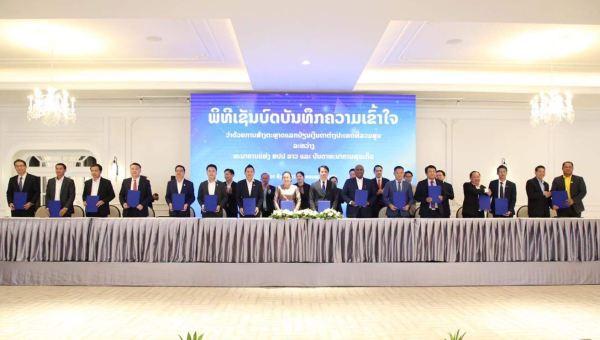KPL
(KPL) The Bank of the Lao PDR (BOL) signed on August 5 a Memorandum of Understanding (MoU) with commercial banks to establish a centralized foreign exchange market.
The signing ceremony was attended by BOL Acting Governor Ms. Vathana Dalaloy, President of the Lao Bankers’ Association Mr. Phouthasay Sivilai, and representatives from commercial banks, relevant offices, and the private sector.
 (KPL) The Bank of the Lao PDR (BOL) signed on August 5 a Memorandum of Understanding (MoU) with commercial banks to establish a centralized foreign exchange market.The signing ceremony was attended by BOL Acting Governor Ms. Vathana Dalaloy, President of the Lao Bankers’ Association Mr. Phouthasay Sivilai, and representatives from commercial banks, relevant offices, and the private sector.Mr. Soulisack Thamnuvong, Head of the Monetary Policy Department of the BOL, attributed the initiative to the need to address the imbalance between the demand and supply of foreign currencies in the economy. This imbalance is caused by higher demand for foreign currencies to pay for imported goods and services, high levels of foreign debt, the depreciation of the Lao Kip, and rising inflation.He noted that these problems have inevitably impacted the lives of the Lao people. Moreover, foreign exchange trading in the black market has made it difficult to monitor and collect data on transactions outside the system, hindering the BOL’s policy implementation.“To maintain the stability of the national currency, manage the exchange rate towards greater stability, and encourage the public to use the formal exchange system, the BOL has proposed the establishment of a centralized foreign exchange market. This platform will allow individuals and legal entities to buy and sell foreign currencies conveniently while making it easy for relevant authorities to monitor,” said Mr. Soulisack Thamnuvong.Mr. Phouthasay Sivilai, President of the Lao Bankers’ Association, emphasized the implementation of the system during its pilot phase. The Lao Bankers’ Association will coordinate with relevant departments of the BOL to develop training plans and user manuals for commercial banks that have signed the MoU. This will ensure that they are well-prepared and understand the actual implementation.Currently, the BOL has completed the conceptual design of the market, held a meeting to consult and brainstorm with commercial banks that meet the criteria to become shareholders in the legal entity, and set objectives, outlined concepts, and established conditions for the establishment and transaction model.Fifteen banks are expected to sign the MoU on the establishment of the centralized foreign exchange market.After signing the MoU, the BOL and commercial banks will focus on researching and developing the system and establishing legal entities to realize the exchange market in the near future.
(KPL) The Bank of the Lao PDR (BOL) signed on August 5 a Memorandum of Understanding (MoU) with commercial banks to establish a centralized foreign exchange market.The signing ceremony was attended by BOL Acting Governor Ms. Vathana Dalaloy, President of the Lao Bankers’ Association Mr. Phouthasay Sivilai, and representatives from commercial banks, relevant offices, and the private sector.Mr. Soulisack Thamnuvong, Head of the Monetary Policy Department of the BOL, attributed the initiative to the need to address the imbalance between the demand and supply of foreign currencies in the economy. This imbalance is caused by higher demand for foreign currencies to pay for imported goods and services, high levels of foreign debt, the depreciation of the Lao Kip, and rising inflation.He noted that these problems have inevitably impacted the lives of the Lao people. Moreover, foreign exchange trading in the black market has made it difficult to monitor and collect data on transactions outside the system, hindering the BOL’s policy implementation.“To maintain the stability of the national currency, manage the exchange rate towards greater stability, and encourage the public to use the formal exchange system, the BOL has proposed the establishment of a centralized foreign exchange market. This platform will allow individuals and legal entities to buy and sell foreign currencies conveniently while making it easy for relevant authorities to monitor,” said Mr. Soulisack Thamnuvong.Mr. Phouthasay Sivilai, President of the Lao Bankers’ Association, emphasized the implementation of the system during its pilot phase. The Lao Bankers’ Association will coordinate with relevant departments of the BOL to develop training plans and user manuals for commercial banks that have signed the MoU. This will ensure that they are well-prepared and understand the actual implementation.Currently, the BOL has completed the conceptual design of the market, held a meeting to consult and brainstorm with commercial banks that meet the criteria to become shareholders in the legal entity, and set objectives, outlined concepts, and established conditions for the establishment and transaction model.Fifteen banks are expected to sign the MoU on the establishment of the centralized foreign exchange market.After signing the MoU, the BOL and commercial banks will focus on researching and developing the system and establishing legal entities to realize the exchange market in the near future.KPL